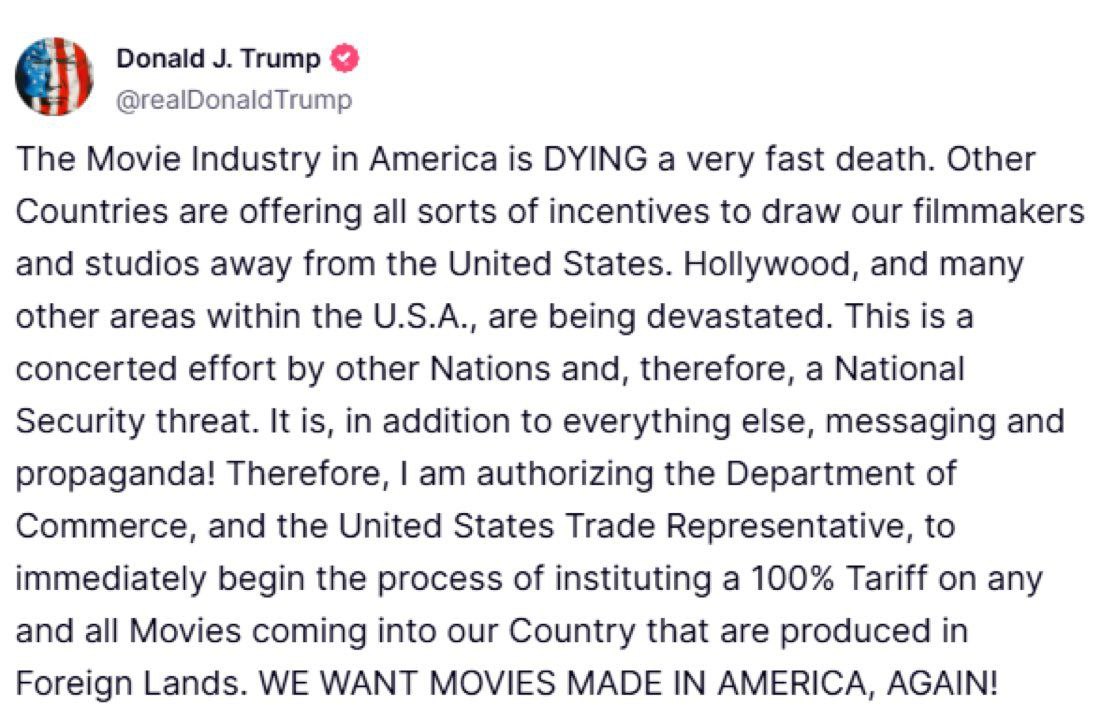United States President Donald Trump has launched a fresh offensive in his long-standing tariff campaign, this time targeting the global film industry. In a post on his Truth Social platform on Sunday night, Trump declared that he had instructed the Department of Commerce and the Office of the US Trade Representative to impose a 100 per cent tariff “on any and all Movies coming into our Country that are produced in Foreign Lands.”
“The Movie Industry in America is DYING a very fast death," Trump wrote, adding that other countries “are offering all sorts of incentives to draw” filmmakers and studios away from the US. “This is a concerted effort by other Nations and, therefore, a National Security threat. It is, in addition to everything else, messaging and propaganda!”

It remains unclear how such a sweeping measure might be enforced, especially given the international nature of most major productions. High-profile films such as Mission: Impossible – The Final Reckoning involve shoots across multiple countries, often combining both US and foreign locations.
For decades, tax incentives have played a pivotal role in determining filming locations, often diverting production away from Hollywood. Countries like Canada and the United Kingdom, as well as several American states, have been especially active in offering financial advantages to studios.
Tariffs traditionally aim to sway consumers toward domestic alternatives. Yet in American cinemas, domestically produced films continue to dominate box offices. Nonetheless, Trump’s remarks appear aimed more at reversing outbound production trends than reshaping local viewing habits.
China, one of the few countries ramping up its own film output, recently witnessed blockbuster success with Ne Zha 2, which grossed over USD 2 billion—largely within China. Its North American earnings were a modest USD 20.9 million.
The Motion Picture Association (MPA) has not responded to requests for comment. However, its 2023 data highlights the international dominance of Hollywood, which produced USD 22.6 billion in exports and posted a USD 15.3 billion trade surplus.
Also read:
Dubbed the “tariff man” during his earlier tenure, Trump has wielded trade levies as a key tool in his economic policy, targeting industries ranging from steel and aluminium to automobiles. Recently, he imposed a 145 per cent tariff on Chinese goods and a 10 per cent baseline on other imports, with further increases expected on items like pharmaceutical products.
Trump’s concern over the outsourcing of film production is not new. Prior to taking office, he named actors Mel Gibson, Jon Voight and Sylvester Stallone as “special ambassadors” to “bring [Hollywood] BACK—BIGGER, BETTER, AND STRONGER THAN EVER BEFORE!”
In recent years, however, America’s entertainment industry has suffered multiple blows. The COVID-19 pandemic, the Hollywood guild strikes of 2023, and wildfires around Los Angeles have disrupted schedules and dented revenues. According to data from ProdPro, domestic film and television production in 2024 declined by 26 per cent compared to 2021.
A survey of film executives conducted by the Hollywood Reporter painted a bleak picture for the US industry. No American location featured among the top five preferred filming destinations; Toronto, the United Kingdom, Vancouver, Central Europe and Australia topped the list, followed by California, Georgia, New Jersey, and New York.
California has borne the brunt of the decline. In the Los Angeles region, production in 2024 fell by 5.6 per cent from the previous year, second only to 2020's pandemic low. In response, Governor Gavin Newsom proposed an expansion of California’s Film & Television Tax Credit programme from USD 330 million to USD 750 million annually.
Other American cities such as Atlanta, New York, Chicago and San Francisco have introduced their own incentives, including tax credits and cash grants, to lure back production.
“Other nations have been stealing the movie-making capabilities from the United States,” Trump told reporters at the White House on Sunday night upon his return from Florida. “If they're not willing to make a movie inside the United States we should have a tariff on movies that come in.”



